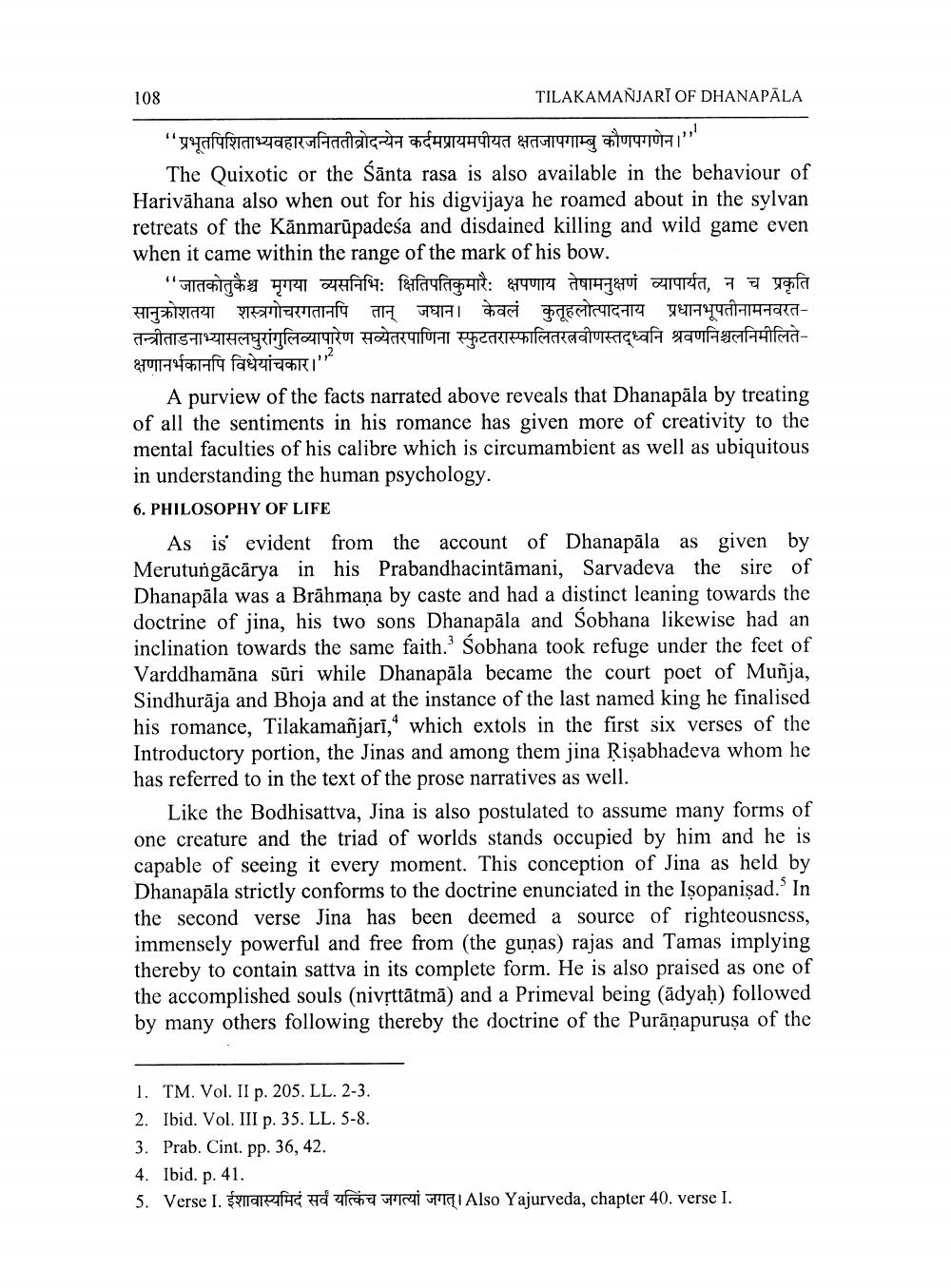________________
108
TILAKAMAÑJARI OF DHANAPĀLA
"प्रभूतपिशिताभ्यवहारजनिततीव्रोदन्येन कर्दमप्रायमपीयत क्षतजापगाम्बु कौणपगणेन।''
The Quixotic or the Šānta rasa is also available in the behaviour of Harivāhana also when out for his digvijaya he roamed about in the sylvan retreats of the Kānmarūpadeśa and disdained killing and wild game even when it came within the range of the mark of his bow.
"जातकोतुकैश्च मृगया व्यसनिभिः क्षितिपतिकुमारैः क्षपणाय तेषामनुक्षणं व्यापार्यत, न च प्रकृति सानुक्रोशतया शस्त्रगोचरगतानपि तान् जघान। केवलं कुतूहलोत्पादनाय प्रधानभूपतीनामनवरततन्त्रीताडनाभ्यासलघुरांगलिव्यापारेण सव्येतरपाणिना स्फुटतरास्फालितरत्रवीणस्तद्ध्वनि श्रवणनिश्चलनिमीलितेक्षणानर्भकानपि विधेयांचकार।"
A purview of the facts narrated above reveals that Dhanapāla by treating of all the sentiments in his romance has given more of creativity to the mental faculties of his calibre which is circumambient as well as ubiquitous in understanding the human psychology. 6. PHILOSOPHY OF LIFE
As is evident from the account of Dhanapāla as given by Merutungācārya in his Prabandhacintamani, Sarvadeva the sire of Dhanapāla was a Brāhmaṇa by caste and had a distinct leaning towards the doctrine of jina, his two sons Dhanapāla and Sobhana likewise had an inclination towards the same faith. Sobhana took refuge under the feet of Varddhamana sūri while Dhanapāla became the court poet of Muñja, Sindhurāja and Bhoja and at the instance of the last named king he finalised his romance, Tilakamañjarī," which extols in the first six verses of the Introductory portion, the Jinas and among them jina Risabhadeva whom he has referred to in the text of the prose narratives as well.
Like the Bodhisattva, Jina is also postulated to assume many forms of one creature and the triad of worlds stands occupied by him and he is capable of seeing it every moment. This conception of Jina as held by Dhanapāla strictly conforms to the doctrine enunciated in the Isopanişad.' In the second verse Jina has been deemed a source of righteousness, immensely powerful and free from the guņas) rajas and Tamas implying thereby to contain sattva in its complete form. He is also praised as one of the accomplished souls (nivýttātmā) and a Primeval being (ādyah) followed by many others following thereby the doctrine of the Purāņapuruṣa of the
1. TM. Vol. II p. 205. LL. 2-3. 2. Ibid. Vol. III p. 35. LL. 5-8. 3. Prab. Cint. pp. 36, 42. 4. Ibid. p. 41. 5. Verse I. fyraf a rma
RITCI Also Yajurveda, chapter 40. verse I.




